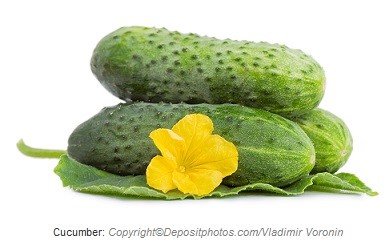Cucumber is a well-known vegetable throughout the world. It is from gourd family related to pumpkin, squash and melons. One cup of sliced cucumber weighs approximately 102 grams and contains 4 grams of carbohydrates. This vegetable is very poor in fiber and protein, 0.5 gram each in one cup.
pumpkin, squash and melons. One cup of sliced cucumber weighs approximately 102 grams and contains 4 grams of carbohydrates. This vegetable is very poor in fiber and protein, 0.5 gram each in one cup.
Average calories: 16 per one cup, sliced.
|
Cucumber: one cup, sliced |
|
|
Carbohydrate |
4 |
|
Fiber |
0.5 |
|
Protein |
0.5 |
|
Fat |
0 |
|
Calories |
16 |
Vitamins found in higher amounts: vitamins K and C. This vegetable is poor in vitamin B group.
Minerals found in higher amounts: potassium, magnesium and manganese.
Phytonutrients found in higher amounts and their health benefits: the three important phytochemicals in cucumber are flavonoids (apigenin, quercetin, and kaempferol), cucurbitacins and lignans (lariciresinol and pinoresinol).
Flavonoids are potent antioxidants with anti-inflammatory, anti-cancer, immune-boosting, and cardioprotective effects.
Lignans, also found in flaxseeds, are converted by bacteria in the digestive system into entrodiol and enterolactone, which are believed to have anti-cancer activities against estrogen-related cancers (breast, uterus, and ovary), and prostate cancer.
Cucurbitacins are natural compounds responsible for the bitterness of cucumber. They are not evenly distributed and found mainly in the vegetative part (the bottom) of the plant. According to recent studies, cucurbitacins have anti-cancer activities.
Other phytonutrients present in cucumbers are phytosterols, especially beta-sitosterol and stigmasterol, 15 mg in one cup. They are plant steroids that have capability to lower bad cholesterol and improve cardiovascular health.

